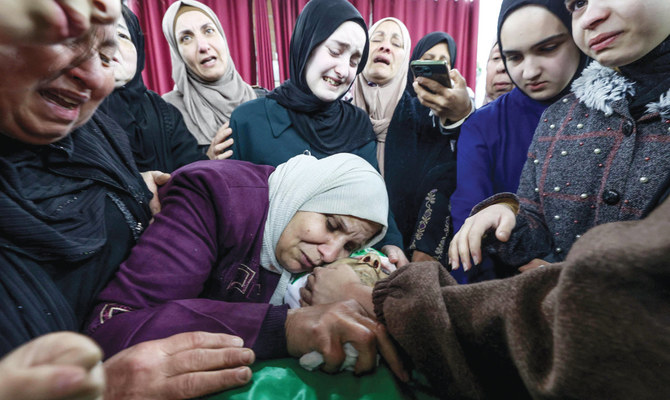JENIN: Two Palestinians believed to be Hamas militants were shot dead by Israeli forces in the West Bank on Wednesday, local sources said, as the army confirmed soldiers had fired at “armed suspects” in the occupied territory.
The incident was the latest in a spate of killings in the West Bank, which has seen a surge in violence since the Israel-Hamas war began in the Gaza Strip in October.
The killings took place before dawn on the compound of the government hospital in Jenin city, in the north of the West Bank, said the hospital’s director, Wissam Bakr.
“It is true that shots were fired at a group of young men” near the entrance to the emergency department, “and there were no confrontations or anything,” he said.
“Snipers started shooting at them after which the two men entered the emergency department where they were martyred.”
Bakr added that four other people were injured in the incident.
Palestinian official news agency Wafa identified the two men as Mahmud Abu Alheja and Rabi Alnawrasi.
Asked about the reported deaths, the Israeli military said soldiers “fired toward armed suspects identified in the area” and that “hits were identified,” but did not confirm fatalities or the exact location of the incident.
It described the operation as “counterterrorism activity.”
“Soldiers apprehended a wanted suspect, in addition to uncovering and dismantling explosive devices that were planted underneath roads in order to attack the forces,” it said.
Later on Wednesday dozens of mourners gathered for the funeral of the two men in the adjacent Jenin refugee camp.
Media footage showed that the bodies, draped in green flags of Palestinian militant group Hamas and with headbands of its armed wing, were taken to a mosque where mourners offered prayers.
The bodies were later buried at a cemetery.
Their deaths followed the killing of a 13-year-old Palestinian boy from a refugee camp on the outskirts of Jerusalem who was shot dead by Israeli forces on Tuesday.
The Israeli police did not confirm the death but said violent riots broke out in the camp for the second consecutive night and that during the unrest, a single shot was fired by an officer toward a suspect “who endangered the forces while firing aerial fireworks in their direction.”
“The suspect was apprehended, arrested, and transferred for medical treatment,” the statement said.
The Palestinian Red Crescent said it treated five wounded by Israeli fire.
Jenin has been the focus of repeated Israeli military raids in recent years, which have often led to clashes with Palestinian militants.
In January, Israeli security agents disguised as medics raided the city’s Ibn Sina Hospital and shot dead three Palestinian militants, who the army said belonged to a “Hamas terrorist cell.”
Walid Jalama, a relative who attended the funeral, said: “The enemy has no red lines. It has surpassed all limits. Previously it raided the Ibn Sina Hospital and assassinated three martyrs there ... Today, it pursued these young men and killed them at the government hospital.”
The Jenin refugee camp adjacent to the city is also one of the most crowded and impoverished in the West Bank and has become a hub of militant activity in recent years.
The Ramallah-based Palestinian Health Ministry says at least 430 Palestinians have been killed in the West Bank by Israeli troops and settlers since the unprecedented attack by Gaza-based Hamas on southern Israel on Oct. 7.
Thousands of others have been arrested.
Meanwhile, a second vessel being loaded with aid for Gaza is currently docked at Larnaca Port and is preparing to depart, Cyprus’ foreign minister said on Wednesday.
The ship will begin its journey to Gaza once the ship operated by the Spanish charity Open Arms, which is now at sea, reaches the territory in the next few days, offloads and distributes its 200 tonnes of food, the minister said.
Minister Constantinos Kombos said the larger vessel will carry more aid than the Open Arms ship, but he wouldn’t say when it would depart exactly. He said that depends on whether all goes smoothly with the delivery of the Open Arms shipment and on weather conditions.
The vessel will tow a barge loaded with aid as well as carrying some in its internal bays. It will offload at the same jetty being built by the US charity World Central Kitchen and where the Open Arms ship will offload.
* With Reuters, AFP and AP




























